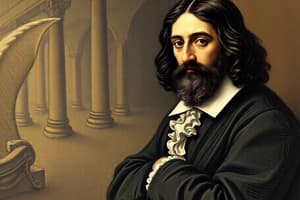Podcast
Questions and Answers
What is a key aspect of critical thinking according to Maboloc and Pascua?
What is a key aspect of critical thinking according to Maboloc and Pascua?
- A lifelong process involving self-assessment (correct)
- An innate ability present from birth
- Automatic acceptance of established truths
- Limited examination of one’s own beliefs
Which of the following is NOT part of the process described in critical thinking?
Which of the following is NOT part of the process described in critical thinking?
- Avoiding the reconsideration of previous ideas (correct)
- Defining and analyzing problems
- Arriving at reasonable and informed conclusions
- Applying understanding to new problems
What does the use of bracketing (Epoché) primarily involve?
What does the use of bracketing (Epoché) primarily involve?
- Focus on personal biases
- Exclusively relying on intuition
- Setting aside biases to focus on experience (correct)
- A strict adherence to preconceived notions
What does philosophy of man enable individuals to appreciate?
What does philosophy of man enable individuals to appreciate?
Which of the following best describes the importance of the philosophy of man?
Which of the following best describes the importance of the philosophy of man?
What does the term 'philosophy' literally mean?
What does the term 'philosophy' literally mean?
Which philosopher is associated with the concept of human reason as the basis of understanding beings?
Which philosopher is associated with the concept of human reason as the basis of understanding beings?
What is NOT a misconception about philosophy?
What is NOT a misconception about philosophy?
Which philosophical field focuses on reasoning and deduction?
Which philosophical field focuses on reasoning and deduction?
How does practical philosophy differ from skeptical philosophy?
How does practical philosophy differ from skeptical philosophy?
What does the term 'axiology' refer to within philosophy?
What does the term 'axiology' refer to within philosophy?
Which philosopher is known for arguments related to morality?
Which philosopher is known for arguments related to morality?
Which of the following correctly reflects the nature of contemporary philosophy?
Which of the following correctly reflects the nature of contemporary philosophy?
What does secular existentialism emphasize about human existence?
What does secular existentialism emphasize about human existence?
How does traditional Christianity view the relationship between essence and existence?
How does traditional Christianity view the relationship between essence and existence?
What key concept is associated with Søren Kierkegaard?
What key concept is associated with Søren Kierkegaard?
What existential concept did Friedrich Nietzsche develop?
What existential concept did Friedrich Nietzsche develop?
What is a common belief held in traditional Christianity regarding moral values?
What is a common belief held in traditional Christianity regarding moral values?
Which aspect of existence do existentialists often highlight as being burdensome?
Which aspect of existence do existentialists often highlight as being burdensome?
What does the phrase 'God is dead' suggest in Nietzsche's philosophy?
What does the phrase 'God is dead' suggest in Nietzsche's philosophy?
What is the primary distinction between secular existentialism and traditional Christianity?
What is the primary distinction between secular existentialism and traditional Christianity?
What does the term 'Dasein' refer to in Heidegger's philosophy?
What does the term 'Dasein' refer to in Heidegger's philosophy?
According to Sartre, what concept precedes essence?
According to Sartre, what concept precedes essence?
What is the main theme explored in Albert Camus' 'The Myth of Sisyphus'?
What is the main theme explored in Albert Camus' 'The Myth of Sisyphus'?
What type of truth is defined as a statement known only by the individual who believes it?
What type of truth is defined as a statement known only by the individual who believes it?
Which statement best describes subjective truth?
Which statement best describes subjective truth?
What do those who deny that truth has a specific nature believe?
What do those who deny that truth has a specific nature believe?
What is objective truth characterized by?
What is objective truth characterized by?
Which type of truth is acknowledged to be true by everyone?
Which type of truth is acknowledged to be true by everyone?
What are the three components that distinguish a human person?
What are the three components that distinguish a human person?
How does St. Thomas Aquinas describe the power of human beings?
How does St. Thomas Aquinas describe the power of human beings?
What aspect of the human experience does the Cognitive Self primarily relate to?
What aspect of the human experience does the Cognitive Self primarily relate to?
What is the essence of the Embodied Spirit in the context of human existence?
What is the essence of the Embodied Spirit in the context of human existence?
According to the Four Noble Truths, what is the root cause of suffering?
According to the Four Noble Truths, what is the root cause of suffering?
What does the Truth of the End of Suffering state regarding desire?
What does the Truth of the End of Suffering state regarding desire?
What is the primary focus of the Eightfold Path in Buddhism?
What is the primary focus of the Eightfold Path in Buddhism?
What does the Physical Self encompass in the context of human life?
What does the Physical Self encompass in the context of human life?
Flashcards are hidden until you start studying
Study Notes
Overview of Modern Philosophy (1600 - 1900)
- Philosophy is derived from the Greek "philos" (love) and "sophia" (wisdom), meaning “love of wisdom”.
- Focuses on man in relation to himself, others, nature, and God.
- Notable philosophers include René Descartes, Blaise Pascal, Baruch Spinoza, and Immanuel Kant.
Contemporary Philosophy (1900 - Present)
- Characterized as "explosive"; lacks a central focus.
- Key figures include Auguste Comte, Henri Bergson, and Jean-Paul Sartre.
Divisions of Philosophy
- Practical Philosophy: Involves fields that apply philosophical knowledge for practical outcomes; seeks to derive normative laws.
- Skeptical Philosophy: Focuses on knowledge acquisition without concern for practical application.
Misconceptions About Philosophy
- Philosophy does not progress like sciences.
- It's more than personal opinions or individual views on life.
- Philosophy is not light reading or mere relaxation material.
Existentialism
- Secular Existentialism: Asserts that life is absurd; individuals create their own values and essence.
- Traditional Christianity: Believes in a transcendent God who defines absolute moral values and predestination.
Key Existentialist Philosophers
- Søren Kierkegaard: Introduced the "leap of faith"; analyzed religious experience and concepts like absurdity and authenticity.
- Friedrich Nietzsche: Proposed the "Übermensch" and declared "God is dead," urging new value creation.
- Martin Heidegger: Developed "Dasein" (being-there), emphasizing existence's connection to the world.
- Jean-Paul Sartre: Advocated "existence precedes essence"; explored themes in "Being and Nothingness".
- Albert Camus: Suggested finding personal meaning in the struggle; explored absurdity, rebellion, and the human condition.
Nature of Truth
- Necessary Truth: A statement whose negation leads to a contradiction.
- Private Truth: Known only to the person who believes it.
- Public Truth: Acknowledged by everyone.
- Subjective Truth: Dependent on personal attitudes.
- Objective Truth: Addresses objective claims which can be proven true or false.
- Universal Truth: Accepted by all.
Importance of Philosophy of Man
- Enhances understanding of human nature and personhood.
- Encourages appreciation of diverse views on humanity.
- Establishes similarities and differences among humans, plants, and animals.
- Promotes improved relationships with others and a better understanding of life’s nature and meaning.
Human Person Dual Components
- Cognitive Self: Beliefs, desires, dreams, and intentions defining the essence of a person.
- Physical Self: Characteristics such as body type, strength, and appearance shaping personal identity.
Embodied Spirit Concept
- Represents the core animating force within individuals, highlighting the unity of body and soul, crucial in both philosophical and religious interpretations.
Buddha's Teachings
- After years of seeking enlightenment, he established the Four Noble Truths:
- Truth of Suffering (Dukkha): Life is inherently filled with suffering.
- Truth of the Cause of Suffering (Samudaya): Suffering stems from desire and attachment.
- Truth of the End of Suffering (Nirodha): Suffering can be overcome by eliminating desire.
- Truth of the Path to the End of Suffering (Magga): The Eightfold Path leads to the cessation of suffering.
Studying That Suits You
Use AI to generate personalized quizzes and flashcards to suit your learning preferences.




